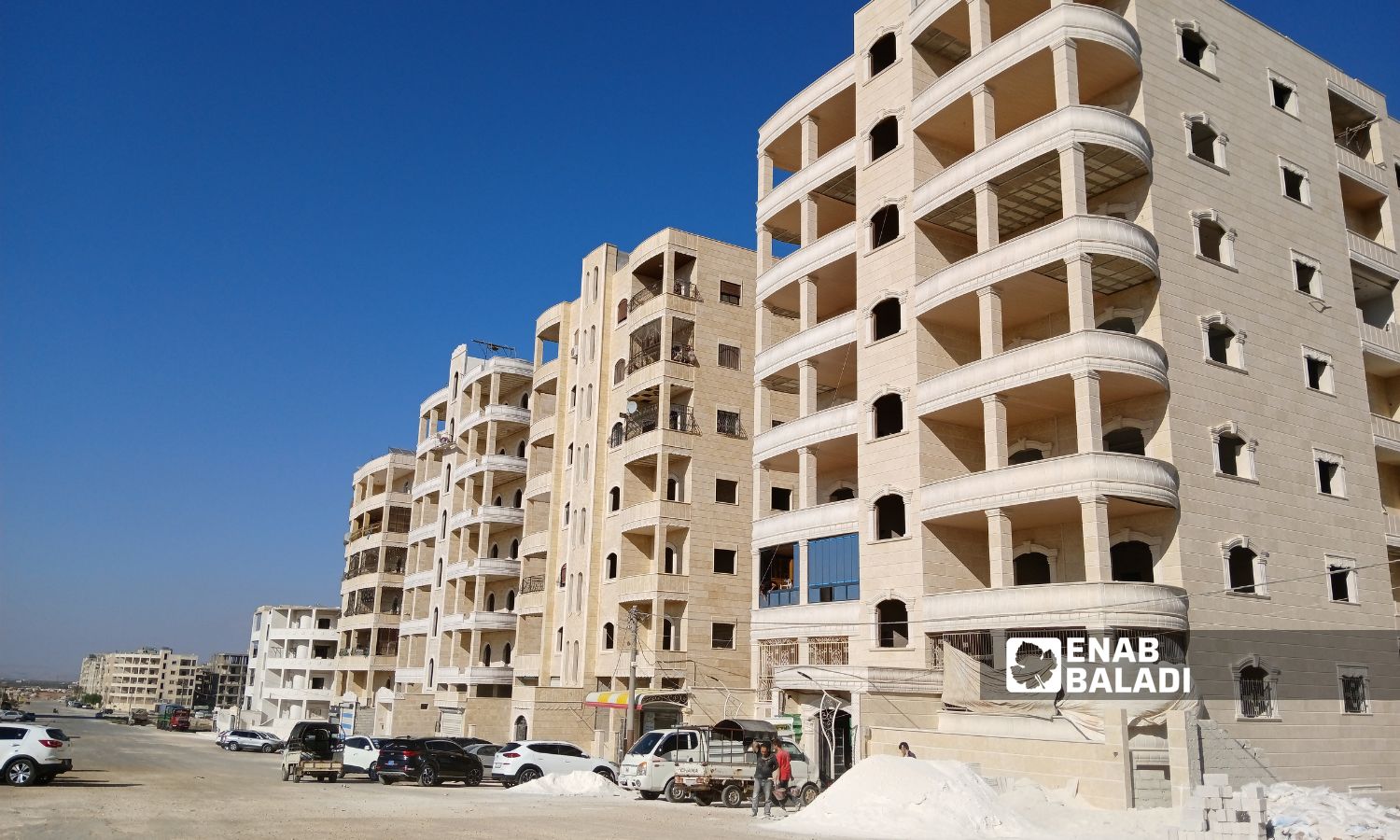



Idlib – Samah Alloush
Finding a house for rent has become a daunting task in the city of Idlib, northwest Syria, severely affecting internally displaced persons and those relocated to the area. Their main concern has become finding housing that aligns with their financial capabilities.
The housing search has re-emerged as a top concern, creating a nightmare known as “the start of the month,” following a rise in property prices for several reasons, most notably increased demand and population density.
The search for a place to live is a recurring crisis in the city, which fell out of Syrian regime control in 2015, becoming a sanctuary for displaced persons from most Syrian cities and towns.
Thana al-Yassin, a displaced woman from the town of Marshamshah in the Maarat district, faces increasing struggles with the rising rent of her home in Idlib. She told Enab Baladi that the rent “is a significant burden weighing heavily on her,” especially when the house owner demands that she vacate the premises.
She added that the eviction demands have repeated, as the owner wants to increase the rent or perhaps give it to one of his acquaintances.
After eviction, she mentioned that she has now settled in a home for which she pays $100 a month to a real estate agent, as the house owner is abroad. However, some issues arose between the agent and the homeowner, leading to a notice for her to vacate.
The woman has a sick daughter, preventing her from living in camps. She concluded with sorrow tinged with hope for returning to their town, mentioning that she sacrifices many essentials like food and clothing to gather the rent money every month so they can “live under a roof that shelters and protects us.”
The rise in rental prices has forced many families to seek housing that does not meet their needs. For example, Ahmad lives on the sixth floor of a building without an elevator in an area considered “remote” (on the city outskirts) in Idlib, just to ensure the rent is $100 or less.
If he decides to move to a similar three-bedroom house within the city closer to the market and vital places and on the third floor, he would have to pay $150 a month or possibly more.
A real estate agent in Idlib told Enab Baladi that rental values in Idlib have risen by 60 to 70% over the past year. A house that used to rent for $60 or $75 is now $100 or $125.
He added that the primary reason is the low number of houses available for rent, resulting from population density, especially after thousands of Syrians were deported from Turkey to northern Syria.
The border crossings with Turkey witness daily deportations of Syrians through Bab al-Hawa, Bab al-Salamah, Tal Abyad, and Jarablus.
In a previous statement, the media director of the Bab al-Hawa crossing, Mazen Alloush, told Enab Baladi that the number of returnees from Turkey to northern Syria through the crossing reached 24,334 people by mid-2024, distributed between 11,973 “voluntary returnees” and 12,361 forcibly deported.
The real estate agent noted a clear tendency to live in the city, as central Idlib has become a destination for companies and shops, attracting the workforce that needs housing close to their workplace.
When asked about the possibility of middlemen controlling rent values for higher commissions, he refuted the idea as unrealistic. He said house owners need continuous rental income, and a middleman insisting on a high price would result in the house not being rented.
Regarding the suggestion that the government should set rent values, he said it’s not up to him to decide, but it might be a suitable solution to settle much of the debate over rising property prices.
In an interview with another middleman, Mustafa from Al-Mais Real Estate Office, affirmed that the primary reason for high rents is the low number of available rental houses, leading owners to demand higher prices and control the market.
Idlib suffers from population congestion, imposing additional challenges on its residents. Clear statistics on its population are missing due to overlap with areas in the countryside of Aleppo.
The population density problem worsened after the earthquake disaster in February 2023, making Idlib a destination for hundreds of earthquake-affected families.
Concerning the housing and rent crisis, the Director of Public Relations in the Syrian Salvation Government (SSG) operating in Idlib, Abdul Rahman Muhammad, stated there are no regulations for property owners determining rent values.
He told Enab Baladi that some steps are being taken to alleviate the people’s suffering, such as facilitating the work of associations and organizations in building housing, providing lands for free for residential projects, and setting standards for securing housing for people with disabilities.
He highlighted the government’s role in encouraging construction and investment in properties through reducing fees, completely canceling some for small areas, and abolishing fees for buildings damaged by the earthquake and bombings, while continuing to implement various projects like housing associations and launching new housing projects.
He mentioned that controlling rental contracts between tenant and owner aims to prevent constant rent increases through indirect steps such as:
Northwest Syria is home to 5.1 million people, with 4.2 million in need of assistance and 3.4 million food insecure. 3.4 million are internally displaced, and 2 million live in camps, according to the United Nations. Local statistics suggest a population of 5.5 to 6 million people.
if you think the article contain wrong information or you have additional details Send Correction